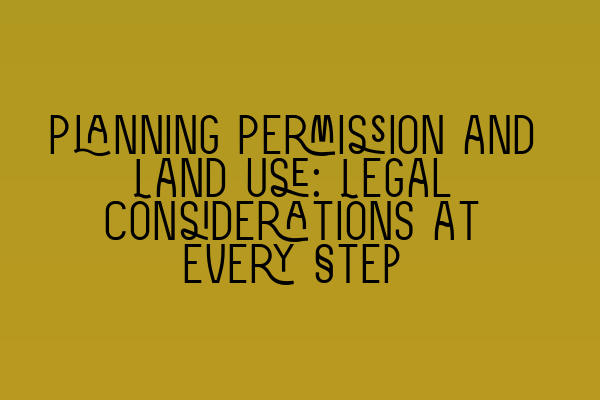Planning Permission and Land Use: Legal Considerations at Every Step
As a property owner or developer, understanding the intricacies of planning permission and land use is crucial to ensure compliance with the law and avoid unnecessary legal disputes. The process of obtaining planning permission can be complex and may involve various legal considerations at every step. In this blog post, we will explore these legal aspects and provide valuable insights for navigating through the planning permission process.
Before delving into the legal considerations, let’s first define planning permission and its importance. Planning permission is the formal consent granted by local authorities, usually in the form of planning departments or councils, for a specific type of development on a particular piece of land. This consent is necessary to ensure that the proposed development complies with local planning policies, preserves the environment, and meets the needs of the community.
The first step in any development project is to determine whether planning permission is required. Some minor works, such as routine repairs or alterations, may not require planning permission. However, it is always prudent to consult with a solicitor or a planning consultant to avoid potential legal complications later on. They can provide valuable advice on whether your proposed development falls within permitted development rights or requires planning permission.
Once you have established the need for planning permission, the next step is to prepare the planning application. A well-prepared application is crucial for a successful outcome. It should include detailed plans, site maps, and any other documents required by the local planning authority. Your solicitor can assist you in preparing a comprehensive application that addresses all relevant planning policies and regulations.
The legal considerations at this stage involve ensuring that your application complies with national, regional, and local planning policies. This includes adhering to zoning regulations, environmental impact assessments, and any other legal requirements specific to your location. Paying attention to these legal intricacies can help expedite the planning permission process and increase the chances of a positive outcome.
It is essential to regularly communicate with the planning authority throughout the application process. Your solicitor can act as an intermediary and facilitate effective communication with the authority. This ensures that any concerns or queries raised by the authority are addressed promptly, minimizing potential delays and legal setbacks.
During the planning process, it is critical to consider the legal rights and interests of others that may be affected by your proposed development. This may include neighboring property owners, community groups, or environmental organizations. Conducting thorough research and addressing any potential objections or conflicts of interest in your application can mitigate legal disputes later on.
It is worth noting that planning permission may also be subject to conditions imposed by the planning authority. These conditions are legally binding and must be adhered to once planning permission is granted. Your solicitor can review these conditions and advise you on the best course of action to fulfill them, ensuring compliance with the law and avoiding any potential legal repercussions.
In some cases, the planning authority may refuse your application. If this happens, it is essential to seek legal advice promptly. Your solicitor can review the reasons for refusal and help you assess the feasibility of appealing the decision. Appeals are heard by planning inspectors or in some cases by the courts, and your solicitor can guide you through the appeal process and represent your interests effectively.
In conclusion, obtaining planning permission is a critical step in any property development project. Navigating through the legal considerations involved can be challenging, but with the assistance of a knowledgeable solicitor, you can ensure compliance with the law and increase the chances of a successful outcome.
At SQE Property Law & Land Law, we offer expert legal advice and assistance to property owners and developers at every stage of the planning permission process. Our team of experienced solicitors can guide you through the legal intricacies, help you prepare robust planning applications, and represent your interests in any legal disputes or appeals.
For more information on our services or to speak to one of our solicitors, please visit our website. We also offer SQE 1 and SQE 2 preparation courses, as well as practice exam questions and mock exams to help you succeed in your legal career.
Related Articles:
– SQE 1 Practice Exam Questions
– SQE 1 Practice Mocks FLK1 FLK2
– SQE 2 Preparation Courses
– SQE 1 Preparation Courses
– SRA SQE Exam Dates
